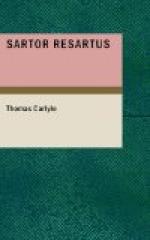“System of Nature! To the wisest man, wide as is his vision, Nature remains of quite infinite depth, of quite infinite expansion; and all Experience thereof limits itself to some few computed centuries and measured square-miles. The course of Nature’s phases, on this our little fraction of a Planet, is partially known to us: but who knows what deeper courses these depend on; what infinitely larger Cycle (of causes) our little Epicycle revolves on? To the Minnow every cranny and pebble, and quality and accident, of its little native Creek may have become familiar: but does the Minnow understand the Ocean Tides and periodic Currents, the Trade-winds, and Monsoons, and Moon’s Eclipses; by all which the condition of its little Creek is regulated, and may, from time to time (unmiraculously enough), be quite overset and reversed? Such a minnow is Man; his Creek this Planet Earth; his Ocean the immeasurable All; his Monsoons and periodic Currents the mysterious Course of Providence through AEons of AEons.
“We speak of the Volume of Nature: and truly a Volume it is,—whose Author and Writer is God. To read it! Dost thou, does man, so much as well know the Alphabet thereof? With its Words, Sentences, and grand descriptive Pages, poetical and philosophical, spread out through Solar Systems, and Thousands of Years, we shall not try thee. It is a Volume written in celestial hieroglyphs, in the true Sacred-writing; of which even Prophets are happy that they can read here a line and there a line. As for your Institutes, and Academies of Science, they strive bravely; and, from amid the thick-crowded, inextricably intertwisted hieroglyphic writing, pick out, by dexterous combination, some Letters in the vulgar Character, and therefrom put together this and the other economic Recipe, of high avail in Practice. That Nature is more than some boundless Volume of such Recipes, or huge, well-nigh inexhaustible Domestic-Cookery Book, of which the whole secret will in this manner one day evolve itself, the fewest dream.
“Custom,” continues the Professor, “doth make dotards of us all. Consider well, thou wilt find that Custom is the greatest of Weavers; and weaves air-raiment for all the Spirits of the Universe; whereby indeed these dwell with us visibly, as ministering servants, in our houses and workshops; but their spiritual nature becomes, to the most, forever hidden. Philosophy complains that Custom has hoodwinked us, from the first; that we do everything by Custom, even Believe by it; that our very Axioms, let us boast of Free-thinking as we may, are oftenest simply such Beliefs as we have never heard questioned. Nay, what is Philosophy throughout but a continual battle against Custom; an ever-renewed effort to transcend the sphere of blind Custom, and so become Transcendental?




